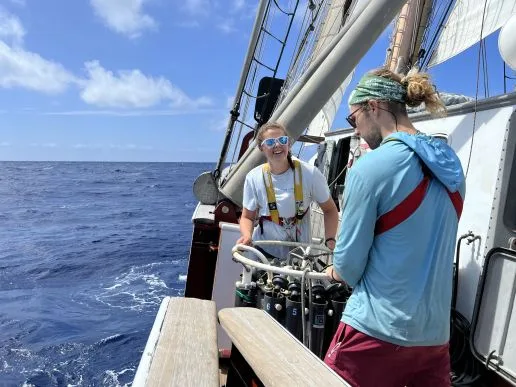Programs Blog
Learning to Embrace the Uncomfortable

Amelia Koval, A Watch, University of Vermont
Ship’s Log
Noon Position
15° 12.8’ N, 153° 06.2’ W
Ship Heading
345°
Ship Speed
7 knots
Taffrail Log
2751 nautical miles
Weather / Wind / Sail Plan
Overall overcast skies (6 eights) with ENE winds at force 4; Sailing under the four lowers and the JT with a deep reef in the main
Description of location
the middle of the Pacific Ocean
“Woosh!” I hear as I sit bolt upright in reaction to Katherine’s presence. We both burst into tired giggles as we process my abrupt reaction to the wake up. Katherine quickly tells me that it is 0603 and I have 17 minutes until breakfast. I have slowly become used to audible wake ups. It’s comforting to know that someone else is responsible for making sure I’m awake and functioning before standing watch rather than anxiously pressing the snooze button on my jarring phone alarm. I become vertical and decide which shirt I can stand the smell of most. At this point, doing laundry is just making small steps towards the elusive designation of clean. I grab my toothbrush, hairbrush, and fleece and head to the quarterdeck. A week ago, I would not believe I was wearing a fleece or sleeping with a top sheet, but we are in fact many degrees north of the equator. I braid my hair and spit my tooth paste over the leeward side of the vessel. I join the rest of my watch in the main salon for a warm breakfast. I scarf down some oatmeal and quickly place my harness over my clothes as I head to lab for turnover. Today was our last watch in the shadow phase before heading into JWO/JLO (Junior Watch Officer/Junior Lab Officer). In preparation, we gybed a total of six times so that each watch member could have a turn calling. What a dizzying experience! The commands are slowly becoming more normal, and I now instinctively repeat every command I hear loud and clear.Today I was the designated lab shadow which entailed calling the hydrocast deployment. I’m still mastering the long list of details, but I’m working on confidently leading deployments even if I’m not 100% confident in the procedure. I know that I have an amazing safety net that allows me to test my limits while still being safe. Everything went smoothly and we (the lab team) secured the science gear and checked in with deck to gybe out of station. It’s amazing how a process starts to make sense on the sixth go ‘round.At the end of watch, Franny and I extracted the otoliths of a flying fish that decided to join the ship’s company. Otoliths are a crystalline ear structure that grows with the fish. This means that we can use otoliths to age a fish as well as learn about the chemistry of the water that the fish has lived in. As a bonus, otoliths make beautiful earrings. These fish have kept us company for the entire trip. I love standing on lookout and watching schools of flying fish glide right below the bow sprit.As I enter the last phase of this voyage, I’m both excited and nervous. I know I’ll never feel ready for the added responsibilities that this stage requires, but I’m excited to experience it with my watch and see how we deal with challenges as well as the creative solutions we utilize. I’m also so excited to see land. The ocean is a lovely companion, but a green tree, cold ice cream, and solid ground are sounding pretty great right about now. I cannot wait to return to the northeast and sip a warm cup of coffee as I listen to the birds and hang out with my mother on the porch. I’ve realized that all I need is good coffee, slow mornings, and even better company. Until then, I’m trying “not to lick the barn door” as Danny says and stay present.Just wanted to say hello to everyone at home! I miss you all very much and cannot wait until this communication becomes a two-way street and I can hear about all the happenings of the last month. Hannah, I hope your orchestra concert went well (especially the planets) and you’re defrosting from a long winter.Amelia Koval, A Watch, University of Vermont
Recent Posts from the Ships
- Ocean Classroom 2024-A collaborative high school program with Proctor Academy
- Collaborations and Long-term Commitments: SEA’s Caribbean Reef Program Sets a Course for Coastal Programs that Compliment Shipboard Experiences.
- Sea Education Association students prepare for life underway using state of the art nautical simulation from Wartsila Corporation.
- SEA Writer 2022, Magazines From the Summer SEA Quest Students
- Technology@SEA: Upgrades Allow Insight into Ocean Depths
Programs
- Gap Year
- Ocean Exploration
- High School
- Science at SEA
- SEA Expedition
- SEAScape
- Pre-College
- Proctor Ocean Classroom
- Protecting the Phoenix Islands
- SPICE
- Stanford@SEA
- Undergraduate
- Climate and Society
- Climate Change and Coastal Resilience
- Coral Reef Conservation
- Marine Biodiversity and Conservation
- MBL
- Ocean Exploration: Plastics
- Ocean Policy: Marine Protected Areas
- Oceans and Climate
- Pacific Reef Expedition
- The Global Ocean: Hawai'i
- The Global Ocean: New Zealand